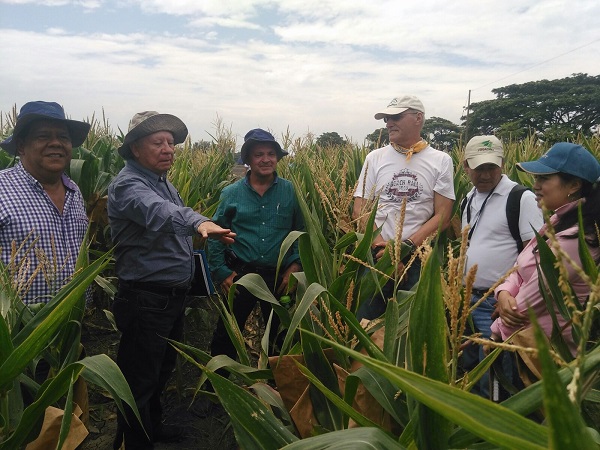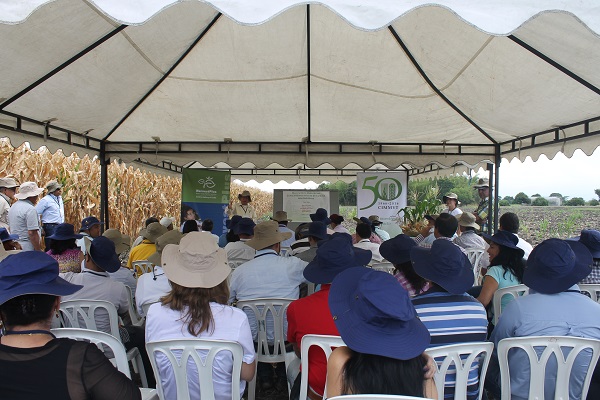
PALMIRA, COLOMBIA — A field day was organized at the International Center for Tropical Agriculture (CIAT) to show the advances of CIMMYT’s HarvestPlus project in Colombia and throughout Latin America. 58 participants representing regional agriculture, education and health sectors, Colombian agricultural institutions, seed producing companies and producers’ guilds, non-governmental organizations and food processing and supply companies. CIAT and CIMMYT staff involved in HarvestPlus also attended the event.
Conferences held during the field day aimed to show participants the benefits of a biofortification program. Meike Anderson, a HarvestPlus crop development specialist of presented strategic priorities for developing and commercializing biofortified crops, emphasizing more than 2 billion people worldwide suffer from hidden hunger, or micronutrient deficiencies.
HarvestPlus was created to combat hidden hunger, and operates in over 40 countries with more than 200 partners. The project began in 2004 and is now in the dissemination phase. HarvestPlus is directly in line with the CGIAR’s goal to ensure improved crop varieties are designed to have high in nutritional value. HarvestPlus in turn has prioritized the development of maize seed with high zinc and provitamin A content. In Colombia 20% of the population is zinc deficient as it much of the population in other Latin American countries including Guatemala, Nicaragua, Brazil, Mexico and Peru.
Maize is the staple food of around a third of malnourished children all over the world. In Colombia 25% of children under 5 years of age present vitamin A deficiency. Biofortified food could have a huge impact improving diet in Colombia and across the globe.
CIMMYT aims to include higher protein quality, lysine, zinc and provitamin A in biofortified maize. To date, there are at least 10 biofortified varieties than after released that can be sown by farmers for both urban and rural consumers, all which were on display during the field day. A farm-to-plate strategy including beans, rice, cassava and yams should also be implemented.
Carolina Gonzalez, HarvestPlus economist, also presented socioeconomic studies prioritizing biofortification in Colombia during the event, identifying areas on the Atlantic coast as the greatest in need due to high levels of vitamin A and zinc deficiency. Sonia Gallego, post harvest Research Assistant of HarvestPlus, provided information from retention and nutrition studies on biofortified maize, emphasizing how important maize grain processing and conservation from harvest to food production are for vitamin A and zinc availability in the human body.

Field activities were also presented by CIMMYT researchers Felix San Vicente and Luis Narro. They emphasized the importance of delivering to farmers biofortified maize seeds that still produce yields that can compete with their competitors. During an event hosted earlier in the year evaluating biofortified hybrids, the grain yield of the best hybrid was nearly ten tons per hectare, which is on par with the best performing maize used as a control group. This proves that high zinc or protein content does not cause farmers a loss in yield – just gains in nutritional. Biofortification also proved to have no effect on other traits like disease resistance, grain type or plant architecture.
At the end of the field day, teams identified institutions and companies that will take charge of varietal release and the seed production process in Colombia, including CORPOICA, Fenalce, Semivalle and Semillas Guerrero. In addition, CIMMYT will simultaneously sow plots to demonstrate to seed companies and other institutions the agronomic traits of different varieties.
Government programs that provide food for school children were also identified as potential collaborators to meet high demand for maize and malnourished children in that state of Valle del Cauca. Colombia demands is 1,200,000 tons of maize for food uses annually, with many producers and processing companies interested in the benefits of using biofortified maize and other crops.
Everyone who attended the workshop evaluated plant and grain traits and compared experimental plot yields. As a result, the seed companies decided to organize agronomic evaluation plots starting in 2016 and establish semi-commercial plots of hybrids, with the goal to release the first biofortified maize in 2017.
Among workshop attendees were CORPOICA and ICA, seed companies Semivalle, Maxisemillas, Semillas del pacífico and Procampo, producers guilds FENALCE, FEDERECAFE and ARDECAN, non-governmantal organizations including CETEC, FIDAR and CLAYUCA and companies Fundación Naturaleza y Vida and Pampa also attended.
 Nutrition, health and food security
Nutrition, health and food security 
